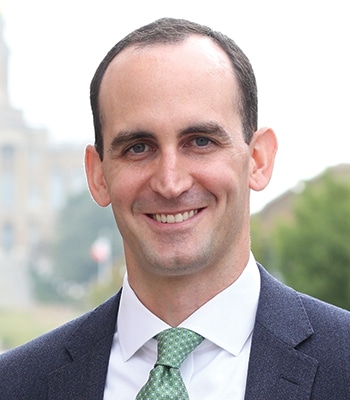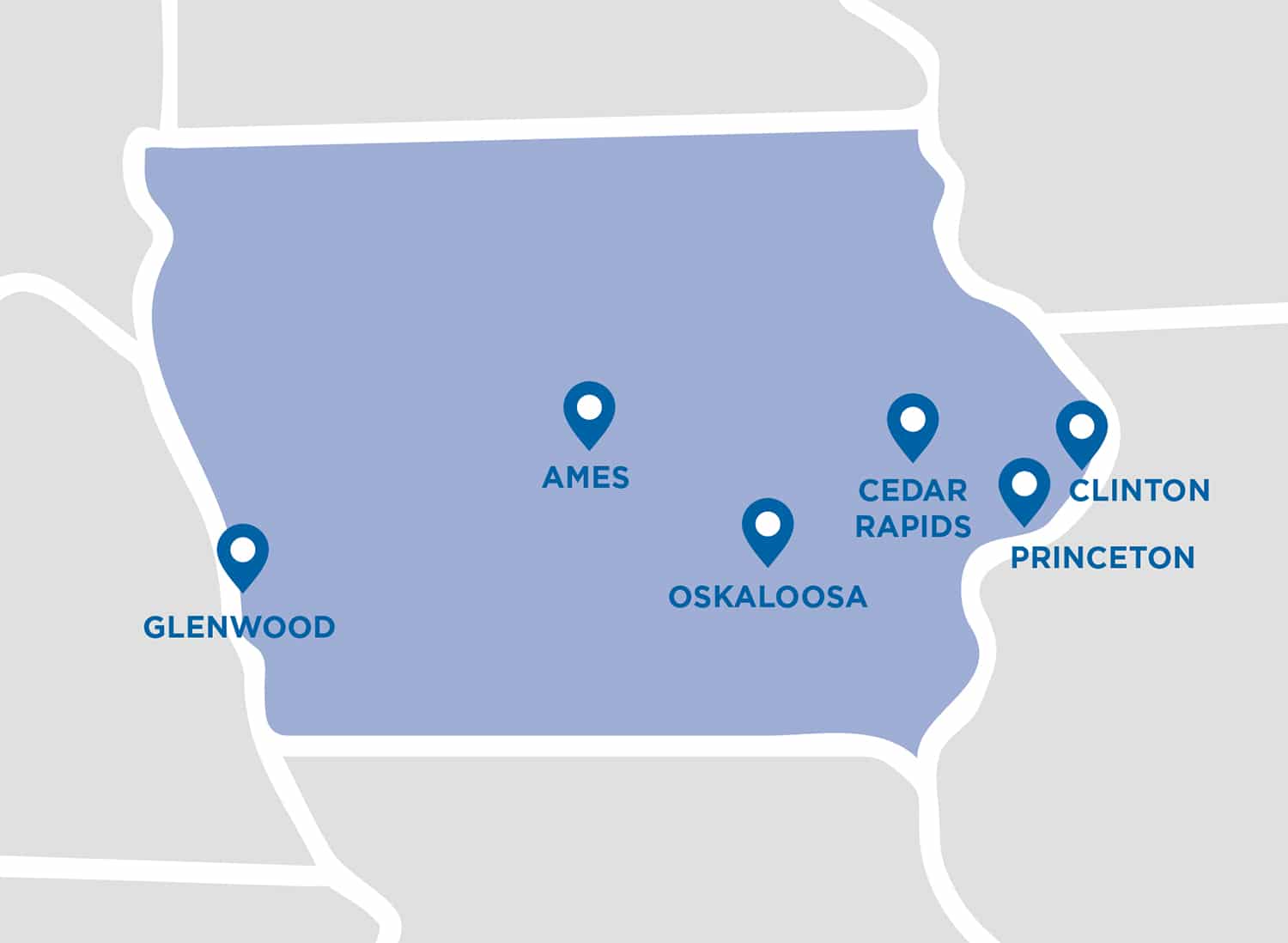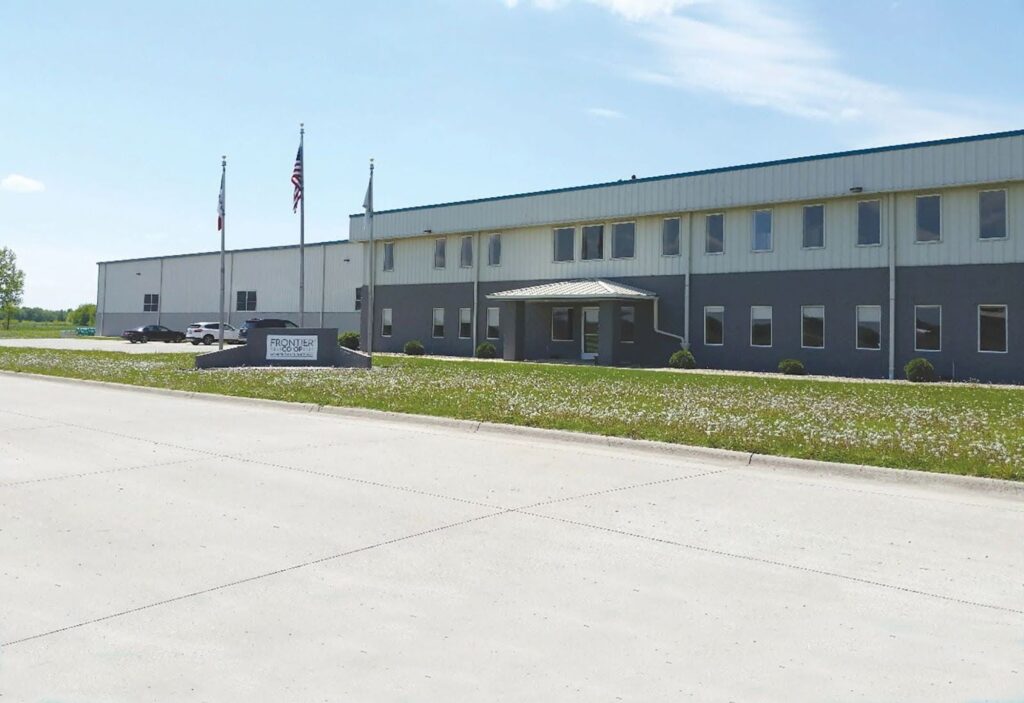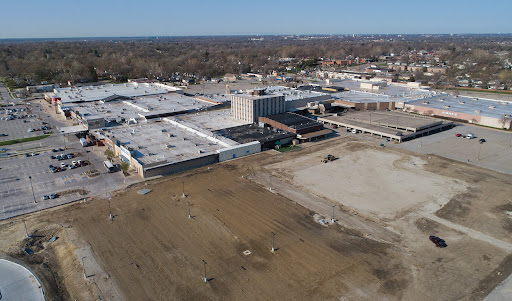Closing $1 billion deals
The MEGA tax incentives program is moving at the state Capitol. Can it bring new industry to Iowa?

Mike Mendenhall Mar 1, 2024 | 6:00 am
8 min read time
1,955 wordsEconomic Development, Government Policy and LawIn May 2023, the U.S.-based manufacturing arm of Italy’s global energy company Enel Group announced it plans to invest $1 billion-plus to build a solar panel manufacturing plant in Inola, Okla.
The multiphase project by Enel subsidiary 3Sun USA LLC was described by the company as one of the largest solar photovoltaic cell and panel-making facilities in the U.S., according to a news release at the time of the announcement.
It’s planned for a portion of a 2,200-acre site controlled by Tulsa Ports, and the company has committed to creating 1,000 new permanent jobs at the facility by 2025. Another 900 could be added in the following years through a potential second phase.
Iowa Economic Development Authority officials said Enel considered Iowa before its final decision to build at the site near Tulsa.
Part of the draw to Oklahoma was state tax incentives.
Enel was in talks with IEDA officials to bring the solar manufacturing project to the 730-acre Prairie View Industrial Center in Ames, IEDA officials noted in a Feb. 8 email to the Business Record.

IEDA and Iowa Finance Authority Director Debi Durham has been working with state lawmakers since the 2023 session to pass legislation authorizing funding for the Major Economic Growth Attraction (MEGA) program designed to lure companies to build $1 billion projects on IEDA-certified, shovel-ready sites across Iowa using a suite of tax refunds and credits.
The MEGA program aims to attract large U.S.-based and international businesses to the state.
The proposed MEGA program would target companies like Enel that are “primarily engaged” in the advanced manufacturing, biosciences, and research and development sectors, the legislation states.
“We needed to have the ability to be able to close the [financial] delta on these large projects,” Durham said in a Feb. 7 interview with the Business Record.
An earlier iteration of the legislation passed the Iowa Senate 45-2 near the end of the last session but didn’t make it to the House floor.
But just over a month into the 2024 session, an amended version of the bill, Senate File 574, is moving again. It passed the House Ways and Means Committee 23-2 on Feb. 21, after it was amended by a subcommittee 3-0 on Feb. 6 to tighten language preventing businesses with ties to countries that are foreign adversaries of the U.S. from controlling the land selected for the projects.
Observers expect the bill to be taken up by the full House in the coming weeks before returning to the Senate to approve the amended version.
IEDA officials and business groups supporting the MEGA legislation said the new incentives program is necessary to recruit manufacturers in burgeoning industries, to bolster job creation in rural Iowa and to be able to compete with other states trying to draw investment from large companies.

“Competition amongst the states is a fact of life in state-level economic development,” JD Davis, Iowa Association of Business and Industry vice president of public policy, said via email Feb. 21.
“Concerns that were expressed last year around the impact to more rural parts of the state are being addressed this year,” he said. “It is worth noting that some of the sites already eligible under the proposal are considered rural in nature.”
How it works
IEDA’s website shows seven of the agency’s 22 certified sites are big enough to meet the MEGA program’s 250-acre minimum requirement.
The program would refund services tax and sales and use taxes paid to contractors or subcontractors for building and construction materials. The incentives also include a refundable investment tax credit of up to 5% of a company’s capital investment in the project recouped over five years based on project progress performance.
It would also provide the employer with a withholding tax credit.
Data centers, retail businesses and businesses that require a cover charge or membership for customers don’t qualify for incentives under the MEGA legislation.
In addition to the $1 billion investment, businesses would have to create jobs that pay at least 140% of the laborshed wage to qualify for the MEGA incentives.
For example, under the state’s existing High-Quality Jobs program, the qualifying wage threshold for the Enel project in the Ames metropolitan statistical area would have started at $25.06 per hour and increased to at least $30.07 over the project performance period, according to calculations by IEDA.
Under MEGA, the wage threshold to get incentives would have been $35.08 per hour.
Businesses must also offer qualified employee benefits, like health insurance and retirement plans.
Durham said it’s not guaranteed a qualified project selected would receive the maximum amount of incentives.
Under the bill, IEDA is required to make a “good faith effort” to locate businesses in competition with the businesses under consideration for MEGA incentives. The agency will also determine if awarding tax credits to the new business would displace employees at an existing competitor in Iowa.
Durham said the number of jobs created will weigh heavily in the scoring completed by the IEDA board. The agency’s director and staff will negotiate the deals.
Even with the MEGA program incentives, Durham said not every qualified project will choose Iowa. In the Enel project, Durham said the company considered more than state tax incentives.
“There were some differences in our utility rates [with Oklahoma]. I want to be completely candid about that and not mislead,” Durham said. “I don’t know that, if we had the MEGA projects (program), I could have closed the delta on that one, to be honest.”
According to the Enel news release, the energy company also had an existing presence in Oklahoma, with $3 billion invested over a decade in 13 wind farms and a regional office.
Durham said IEDA lost a second solar project proposal last year by an unidentified company that was considering a site in Waterloo. According to Durham, the project had a $70 million financial gap, and its decision to locate in Louisiana was purely based on incentives.
A second try
IEDA based the MEGA program incentives on similar ones from other U.S. states, Durham said.
The amendment approved by the House subcommittee also adds language that aims to keep entities linked to U.S. adversaries abroad from owning the land and acquiring farmland for MEGA projects.
However, it makes it easier for businesses that are based in or with strong ties to countries allied with the U.S. to expand on the certified sites in Iowa.
“This session, we spent all summer, quite frankly, working with House members to answer their questions,” Durham said. “And what we learned was there were a few concerns. The main concern was the foreign ownership of land piece [of the bill] that is only applicable to one site. That is the 1,000-acre MEGA site. And we have one in the state in Mills County.”

The Iowa Business Council, which supports the bill, is a nonpartisan, nonprofit organization made up of 22 chief executives from the state’s largest employers. The organization’s president, Joe Murphy, said he expects the bill to pass with bipartisan support based on last year’s Senate vote.
Durham agrees the program will get both Republican and Democratic support in the House but said she doesn’t expect the vote to be unanimous.
“We drafted legislation that we think is fiscally responsible that meets the needs that we have, and then you’re not publicly negotiating them through a legislative session that only meets four months, or you have to call them back,” she said.
If the bill is approved and signed by Gov. Kim Reynolds, the IEDA’s time and number of deals it can sign under the incentive program will be limited.
The bill would give Durham and IEDA two years to negotiate and secure agreements with two qualified businesses. MEGA would sunset two years after it goes into effect unless it gets reauthorized by the Legislature.
Durham said IEDA officials are already negotiating with an industrial manufacturer using “advanced manufacturing techniques” that she thinks will qualify for the MEGA program. However, she declined on Feb. 7 to identify the company.
“It is not a lot of time to do a deal. So, I’m going to be very candid, I don’t know that I can get two deals done [in the two years],” Durham said. “I think I can get one deal done because we’re already negotiating with a company that we believe will meet the criteria.”
Any MEGA incentives deal will also have to be approved by the community where the project is located by ordinance or resolution, the bill states. The project could also be eligible for additional local, state or federal incentives, excluding the High Quality Jobs program and the targeted jobs withholdings credit, in addition to MEGA aid.
The amended legislation would also make the incentives available to companies with existing facilities in Iowa that are considering an expansion.
Durham said she made that change at the request of lawmakers.
“So, the question that these legislators asked was, ‘Well, Debi, what if you have a campus like a Cargill campus in Eddyville, for instance? They already have the land and they’re going to do a $1 billion project, why would they be excluded? Which is a really good question.”
According to the bill, companies could not use MEGA incentives to relocate their operation from one area of Iowa to another or downsize a facility in one community to build or expand in another.
Murphy said the Iowa Business Council supports the amendment but views the MEGA program primarily as a draw for new businesses to Iowa, particularly in alternative fuel-related manufacturing like wind turbines and solar components.
“I do see it primarily as a recruitment tool for new business,” Murphy said. “But it’s always good to have the flexibility and the resources available if one company pops up and says, ‘Hey, we’ve got, literally, a billion-dollar idea here. Let’s figure something out.’”
Beyond the sunset
IEDA officials and Iowa business groups know they’ll need to show lawmakers that MEGA is working or show progress if they need more time to close on potential projects to get the extension beyond the two-year sunset.
“We believe this will be a very successful and lucrative program for the state. So, when it comes time to reauthorize, we should have many proof points to point to,” Murphy said.
The Greater Des Moines Partnership is supporting the proposed state investment in the MEGA program as an economic development tool. Partnership officials said in December that it could free up state funds for other priorities.

Ryan Moon, the Partnership’s director of government relations and public policy, said there are no qualified MEGA sites in the economic development organization’s 11-county member region, but it will help rural Iowa communities.
“Our state is not the fastest-growing state in the country. When we travel, whether it’s downtown Des Moines or we’re out in Adair or Guthrie [counties], workforce, workforce, workforce is always the need,” Moon said. “So whether it’s an existing business to expand and bring talent into our region or whether it’s a brand-new business, we are hopefully looking forward to getting some of that.”
Existing Iowa Certified Site Program locations that would qualify for the MEGA program
Lincolnway Industrial Rail and Air Park, Clinton
345 Acres
Transportation access: Four-lane highway; rail
The Anderson 400, Princeton
399.06 acres
Transportation access: Four-lane highway; rail; air within 20 miles; barge within
5 miles
Innovation Park, Oskaloosa
499.6 acres
Transportation access; Four-lane highway; rail
Cedar Rapids Land and Air Super Park, Cedar Rapids
582 Acres
Transportation access: Four-lane highway; rail; air within 20 miles
Prairie View Industrial Center, Ames
730 acres
Transportation access: Four-lane highway; rail
Big Cedar Industrial Center, Cedar Rapids
890 acres
Transportation access: Four-lane highway; rail; air within 20 miles
Mills Crossing Mega Site, Glenwood
1,650 acres
Transportation access: Four-lane highway; rail; air within 20 miles

Mike Mendenhall
Mike Mendenhall is associate editor at Business Record. He covers economic development, government policy and law.










